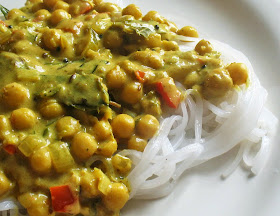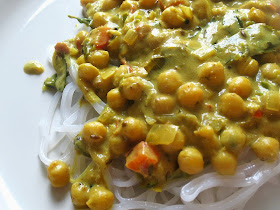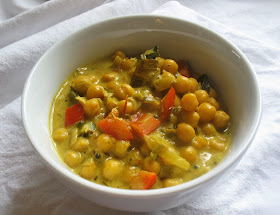I suppose it is an obsession of sorts, but coconut in some form or other has been making it into plenty of both sweet and savory creations lately. Coconut milk in particular muscles into a number of curries lately, so that my pantry shelves are in constant need of replenishment. The creaminess, richness and slight sweetness it imparts to gravies and sauces is not to be matched and one that vegans may want to pay special attention to as it closely mimics the texture of yogurt and truly shines in its own right.
Here coconut partners up with plump, tender and buttery chickpeas and tamarind. The use of tamarind here might be considered optional, but I find it gives a unique sweet and sour citrus flavor to the curry. You can add some freshly squeezed lime juice at the ending of the cooking time if you don't have tamarind on hand or just want to skip a step. The richness and fullness of tart, sour and bittersweet tamarind, however, contributes to the whole culinary experience.

 Chickpeas in a Creamy Coconut Tamarind Gravy Chickpeas in a Creamy Coconut Tamarind Gravy |
Recipe by Lisa Turner
Cuisine: Indian
Published on May 12, 2014
Chickpeas simmered in a thick, creamy, fragrant hot, sour and tangy tomato, coconut and tamarind sauce
Ingredients:
- 1 cup dried chickpeas (3 cups cooked or 2 14 oz cans)
- 1 tablespoon tamarind pulp
- 2 tablespoon olive oil
- 1 teaspoon brown mustard seeds
- 1 teaspoon cumin seeds
- 1 small onion, diced
- 1-inch piece fresh ginger, minced or grated
- 2 cloves garlic, minced or crushed
- 2 to 3 fresh green chilies, seeded and finely chopped
- 1 tablespoon ground coriander
- 1 teaspoon ground cumin
- 1 teaspoon turmeric
- 1/2 teaspoon amchoor powder (optional)
- 1/2 teaspoon paprika
- 1/4 to 1/2 teaspoon cayenne
- 1 small tomato, seeded and diced
- handful of dried curry leaves, crumbled
- 13 1/2 oz (400 mL) can coconut milk
- 1 teaspoon sea salt, or to taste
- fresh chopped parsley or cilantro for garnish (optional)
Instructions:
Rinse the chickpeas and soak for 8 hours or overnight covered in several inches of water. Drain and rinse, then transfer to a medium saucepan and cover with fresh water. Bring to a boil, reduce heat to medium-low, cover, and simmer for 1 to 1 1/2 hours or until tender. Drain and set aside. Meanwhile, soak the tamarind pulp in 2/3 cup of boiling water for 30 minutes. Drain, reserving the liquid, and pressing through a strainer as much of the pulp as you can. Discard the remains and set the liquid aside. Heat the oil in a large saucepan over medium heat. When hot, toss in the mustard and cumin seeds and stir for 30 to 60 seconds or until the mustard seeds turn grey and begin to splutter and pop. Add the onion and sauté for a few minutes until softened. Now add the ginger, garlic and chilies, and continue to stir for another few minutes. Add the spices and stir for a minute until fragrant. Now add the tomato and curry leaves and continue to stir for a few more minutes. Stir in the chickpeas until well coated. Add the coconut milk and about 1/3 to 1/2 cup of the tamarind water along with sea salt. Bring to a gentle boil, reduce heat to medium-low, and simmer uncovered until the sauce is thickened, stirring often. Add more water to reach desired consistency. Serve with fresh chopped cilantro or parsley alongside any meal for a main with rice, Indian flatbreads and a vegetable dish. Alternately, you can serve over rice noodles or pasta.
Makes 4 to 6 servings |

More spicy chickpea offerings from Lisa's Vegetarian Kitchen:
Chickpea Vindaloo
Chickpeas with Mushrooms
Jerk Chickpeas
Chana Masala
On the top of the reading stack: the newspaper
Audio Accompaniment:
Nicolas Bacher
 Chickpeas in a Creamy Coconut Tamarind Gravy
Chickpeas in a Creamy Coconut Tamarind Gravy


 Print this recipe
Print this recipe
How would one make this with tamarind paste instead?
ReplyDeleteStir in the paste along with the water. No need to soak the paste.
ReplyDeleteI love the tanginess of tamarind! Such a nice addition to the curry!
ReplyDeleteJust letting you know I’ve featured your Chickpeas in a Creamy Coconut Tamarind Gravy recipe on my blog. Thanks for sharing such a delicious recipe!
ReplyDeleteThis is AMAZING. So delicious.
ReplyDeletesuper yummy and wholesome!!!
ReplyDelete